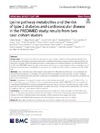Identificador persistente para citar o vincular este elemento:
https://accedacris.ulpgc.es/jspui/handle/10553/70104
| Título: | Lysine pathway metabolites and the risk of type 2 diabetes and cardiovascular disease in the PREDIMED study: Results from two case-cohort studies | Autores/as: | Razquin, Cristina Ruiz-Canela, Miguel Clish, Clary B. Li, Jun Toledo, Estefania Dennis, Courtney Liang, Liming Salas-Huetos, Albert Pierce, Kerry A. Guasch-Ferré, Marta Corella, Dolores Ros, Emilio Estruch, Ramon Gómez-Gracia, Enrique Fitó, Montse Lapetra, Jose Romaguera, Dora Alonso-Gómez, Angel Serra-Majem, Lluis Salas-Salvadó, Jordi Hu, Frank B. Martínez-González, Miguel A. |
Clasificación UNESCO: | 3206 Ciencias de la nutrición 320501 Cardiología |
Palabras clave: | Biomarkers Cardiovascular Disease Dietary Intervention Metabolites Type 2 Diabetes |
Fecha de publicación: | 2019 | Publicación seriada: | Cardiovascular Diabetology | Resumen: | Background: The pandemic of cardiovascular disease (CVD) and type 2 diabetes (T2D) requires the identification of new predictor biomarkers. Biomarkers potentially modifiable with lifestyle changes deserve a special interest. Our aims were to analyze: (a) The associations of lysine, 2-aminoadipic acid (2-AAA) or pipecolic acid with the risk of T2D or CVD in the PREDIMED trial; (b) the effect of the dietary intervention on 1-year changes in these metabolites, and (c) whether the Mediterranean diet (MedDiet) interventions can modify the effects of these metabolites on CVD or T2D risk. Methods: Two unstratified case-cohort studies nested within the PREDIMED trial were used. For CVD analyses, we selected 696 non-cases and 221 incident CVD cases; for T2D, we included 610 non-cases and 243 type 2 diabetes incident cases. Metabolites were quantified using liquid chromatography-tandem mass spectrometry, at baseline and after 1-year of intervention. Results: In weighted Cox regression models, we found that baseline lysine (HR+1 SD increase = 1.26; 95% CI 1.06-1.51) and 2-AAA (HR+1 SD increase = 1.28; 95% CI 1.05-1.55) were both associated with a higher risk of T2D, but not with CVD. A significant interaction (p = 0.032) between baseline lysine and T2D on the risk of CVD was observed: subjects with prevalent T2D and high levels of lysine exhibited the highest risk of CVD. The intervention with MedDiet did not have a significant effect on 1-year changes of the metabolites. Conclusions: Our results provide an independent prospective replication of the association of 2-AAA with future risk of T2D. We show an association of lysine with subsequent CVD risk, which is apparently diabetes-dependent. No evidence of effects of MedDiet intervention on lysine, 2-AAA or pipecolic acid changes was found. Trial registration ISRCTN35739639; registration date: 05/10/2005; recruitment start date 01/10/2003 | URI: | https://accedacris.ulpgc.es/handle/10553/70104 | ISSN: | 1475-2840 | DOI: | 10.1186/s12933-019-0958-2 | Fuente: | Cardiovascular Diabetology, [ISSN 1475-2840], v. 18 (1), (Noviembre 2019) |
| Colección: | Artículos |
Citas SCOPUSTM
42
actualizado el 08-jun-2025
Citas de WEB OF SCIENCETM
Citations
48
actualizado el 01-mar-2026
Visitas
59
actualizado el 11-ene-2026
Descargas
71
actualizado el 11-ene-2026
Google ScholarTM
Verifica
Altmetric
Comparte
Exporta metadatos
Los elementos en ULPGC accedaCRIS están protegidos por derechos de autor con todos los derechos reservados, a menos que se indique lo contrario.
